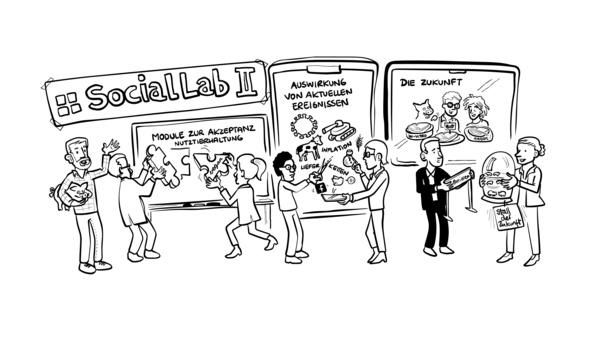Expertise
Future workshop
Marie von Meyer-Höfer and Peter Elsasser | 29.06.2022
Future workshops have already proven successful in many policy areas. Especially when different interest groups are to be involved in innovative developments on socially relevant issues.

Within the framework of a future workshop, various discussion and participation formats can be carried out with different constellations of participants. Usually such workshops last a few months, sometimes they are planned for several years or even as permanent workshops.
A Future Workshop usually takes place in four phases: Entry and criticism phase, utopia phase, realisation phase, follow-up. The focus is usually on a specific thematic issue. In addition, methodological, organisational and institutional issues related to the topic can be addressed.
Phase 1: Complaint/Criticism
Displeasure, criticism, negative experiences on the chosen topic are expressed by the participants. This should be done as free of constraints as possible. The aim is not so much to analyse the problems as to take stock for further work (e.g. with the help of brainstorming and prioritisation methods). The aim of this phase is to leave anger, rage and disappointment behind in order to prepare innovative, creative and constructive work in phases 2 and 3.
Phase 2: Imagination/Utopia
In this phase, the creativity of each individual is called for. Utopian thinking and dreaming are absolutely welcome in order to come up with new possible solutions. Killer phrases like "That's impossible!" are to be avoided at all costs. People are allowed to fantasise here. Various discursive creativity techniques can be used here.
Phase 3: Realisation/Practice
This is where the first two phases of the Future Workshop are linked. It must be assessed what is feasible. The formation of working groups and the involvement of qualified experts can be used. Various procedures for project planning, implementing (social) change and training in the use of cyclical group processes can be used here.
Phase 4: Follow-up
The organisers and facilitators conclude the Future Workshop. The goals, procedures and results are briefly summarised and classified once again in order to be able to decide on the possible continuation of the workshop work, or which conclusions can be derived from the results for policy.
In this multi-stage, professionally moderated and scientifically accompanied discourse and participation process, socially acceptable, practically implementable further development options can be worked out with as many different stakeholder groups as possible. A core group of participants should go through all phases together. In addition, other participants and information can be added as needed.
The aim is to give policy-makers recommendations for action and to show practitioners possible courses of action that will enable sustainable further development.
Example of a current future workshop (in German)
https://www.sociallab-nutztiere.de/projekt/ap3-diskussionsplattform/






